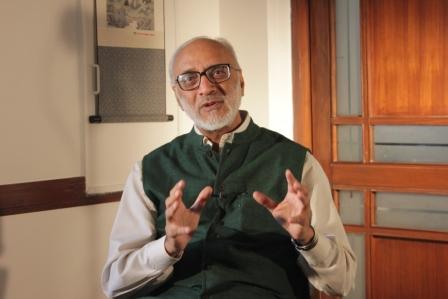
Open agri or risk $50 bn exports’: Economist warns on India’s tariff stance with US
NEW DELHI : Agricultural economist Ashok Gulati has warned that India risks jeopardising $50 billion worth of exports if it refuses to engage on agriculture in the ongoing trade negotiations with the United States. In an exclusive interview with India Today, he said India should rationalise tariffs on farm goods and not fall for “ideological” fears.
“That agriculture is not insulated from the economy,” Gulati said. “We are importing $37 billion worth of farm products, and from the U.S. alone we import just $2 billion. Against that, we export about $5.9 billion. If we remain rigid and refuse to open up any sector, we risk losing the big export of $50 billion.”
He stressed that India already relies heavily on imports. “We are not living in autarky,” he said. “Almost 55 to 60 percent of the edible oil that you consume is imported. To say we will not allow any imports is ridiculous.”
Agriculture and dairy have emerged as the biggest sticking points in the proposed India-US trade deal, with Washington pressing New Delhi to lower tariffs on farm goods. India has so far held firm, citing the need to protect its farmers and rural economy.
India’s tariffs, he argued, were overdue for reform. “If edible oil can come at 10 percent duty and cotton at zero, then why do we have 45 percent duty on corn, 50 to 60 percent on soybean, or skimmed milk powder?” he asked. “We have been unduly overprotective. My feeling is 80 percent of our agriculture is very competitive.”
On the sensitive issue of genetically modified crops, Gulati called India’s policy inconsistent. “Ninety-five percent of cotton in this country is GM, and its seed is fed to poultry and cattle,” he said. “But we say corn, which is mostly feed, cannot be GM. That’s not based on science. It’s an ideology.”
He suggested calibrated measures such as tariff-rate quotas. “Up to two million tons of corn could be allowed when production is around 42 million tons,” he said. “Even if you open up, sometimes you will import, sometimes you will export. Prices are already close to international levels.”
Gulati pointed to the risk of retaliation if India remained inflexible. “Our biggest agricultural export to the U.S. is shrimp, worth billions, and it goes at almost zero duty,” he said. “If they put a 50 percent tariff on it, those exports will collapse overnight. Are we ready to bear that loss — and the political fallout in Andhra Pradesh?”
The economist urged negotiators to strike a balance. “Trade is always give and take,” he said. “If they want self-sufficiency in agriculture, first thing they should do is stop all the imports of edible oils which are 17 billion dollars. 55 to 60% of your consumption of edible oil is being imported. Why are you importing that? Are the farmers of oil seeds not important? So this hypocrisy should not be a part of the negotiation. Trade negotiations are give and take.”

